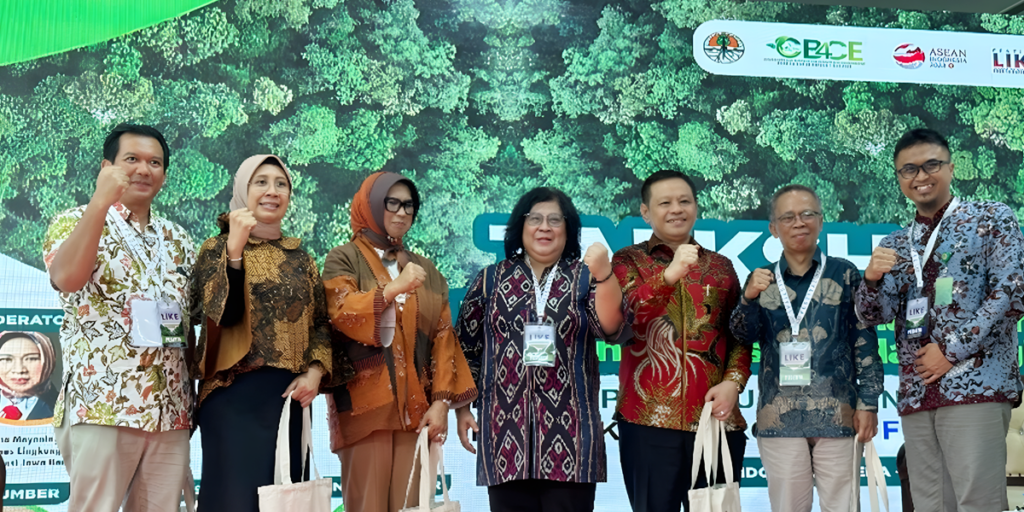Prof Hefni Effendi Expounds on the Role of Environmental Approval in FoLU Net Sink 2030

Prof Hefni Effendi, a Professor at IPB University, explained the role of environmental approval in achieving the Forestry and Other Land Use (FoLU) Net Sink 2030 during a talk show at the Environmental Climate Forestry and Energy (LIKE) Festival Road to COP 28 UAE 2023. In this event, he elaborated that Net Sink refers to the condition where carbon absorption rates are balanced or even higher than the emissions rates in the FoLU sector.
“Every sector in our country must reduce its emissions in line with Indonesia’s commitments in the Paris Agreement 2015. In that a greement, Indonesia pledged to reduce carbon emissions by up to 29 percent by 2030 through its own efforts and an additional 41 percent reduction with international assistance. This commitment was further reinforced in the Nationally Determined Contribution (NDC) document submitted in 2017,” Professor Hefni stated during the event held at Indonesia Arena Senayan Jakarta were as follows.
In order to achieve greenhouse gas (GRK) emission control targets, the government has implemented various policies and action plans, including Presidential Regulation (Perpres) No 98 of 2021 on the Implementation of Carbon Economic Value for the Achievement of Nationally Determined Contribution Targets and Greenhouse Gas Emission Control in National Development. There is also Minister of Environment and Forestry Decree No 168 of 2022 on the Forestry and Other Land Use (FoLU) Net Sink 2030 for Climate Change Mitigation.
Prof Hefni, who is also the Chairman of the Department of Aquatic Resources Management (MSP) in the Faculty of Fisheries and Marine Sciences (FPIK) at IPB University, emphasized that emission reduction efforts are prioritized in the forestry sector. However, all businesses/activities that require environmental approval also play a crucial role in emission reduction.
“This is because obtaining environmental approval requires studies such as Environmental Impact Assessment (Amdal) or Environmental Management Efforts and Environmental Monitoring Efforts (UKL-UPL). To obtain a decision letter of environmental feasibility (SKKLH) the results of the environmental impact analysis must meet 10 environmental feasibility criteria,” he explained.
He noted that several of these environmental feasibility criteria are closely related to the FoLU Net Sink policy. One of the criteria is that the location of the activity must not be in protected areas. This is because protected areas play a role in ecosystem regulation services, such as carbon sequestration, which can be a carbon sink or carbon source.
Another criterion, according to Prof Hefni, is that businesses/activities must comply with environmental regulations. For example, they must adhere to the provisions on emissions that are permitted to be released into the ambient air. This is closely related to the release of GRK emissions by businesses/activities.
“Other environmental feasibility criteria include the necessity to consider key flora (plant) species and ecosystem related interests in the potential location of businesses/activities. This is also highly relevant to ecosystem services related to FoLU Net Sink. The requirement to adhere to carrying capacity and capacity limits also strongly supports this policy,” he added.
The LIKE Festival Road to COP 28 UAE 2023 is an event organized by the Directorate of Environmental Impact Prevention of Business and Activities (PDLUK), of the Ministry of Environment and Forestry of the Republic of Indonesia (KLHK), (16-18/9).
Festival LIKE EBT Road to COP 28 UAE 2023 ini merupakan kegiatan digagas oleh Direktorat Pencegahan Dampak Lingkungan Usaha dan Kegiatan (PDLUK), Kementerian Lingkungan Hidup dan Kehutanan (KLHK) RI, (16-18/9). (IAAS/DSR)
Sources: IPB News
Share